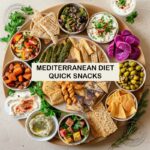Bananas & The Mediterranean Diet
In the landscape of the Mediterranean diet, bananas stand out as a versatile and nutrient-dense fruit.
Bananas are a great choice for this diet due to their balance of energy, vitamins, and minerals.
They’re not just any snack; they’re a smart addition to a food plan that values heart health and nutritional richness.
Think of bananas as nature’s ready-made snack, perfect for fitting into this wholesome eating style.
Nutritional Value of Bananas
Bananas boast a remarkable nutritional profile that aligns with the Mediterranean diet’s goals.
Here’s the breakdown:
- Potassium: Vital for heart health, one medium banana contains around 450 mg.
- Vitamin B6: Crucial for protein metabolism and cognitive development.
- Fiber: A medium banana provides about 3 grams, aiding in digestive health.
These nutrients play a key role in maintaining bodily functions and contributing to a balanced diet.
Quick Snacks For Mediterranean Diet
Embark on a mouthwatering journey through the Mediterranean diet quick snacks, where snacking becomes an exquisite art form. Discover a…
Incorporating Bananas into Your Mediterranean Diet
Enhance your Mediterranean meal plan with bananas:
- Morning boost: Slice a banana into your whole-grain cereal or oatmeal.
- Snack time: A banana with nut butter offers a satisfying mix of sweet and savory.
- Dessert twist: Create a Mediterranean-inspired banana smoothie with Greek yogurt and a drizzle of honey.
Bananas fit effortlessly into this diet, proving that healthful eating can also be delicious and simple.
Understanding the Mediterranean Diet
The Mediterranean diet is more than just a list of foods; it’s a sustainable approach to eating that emphasizes freshness, variety, and balance.
It encourages enjoying meals with family and friends, savoring each bite, and choosing foods that are both good for the body and the planet.
Discover the secret to a healthier lifestyle with the Mediterranean diet, a culinary journey rooted in tradition and packed with…
Key Components of the Mediterranean Diet
This diet consists of:
- Fruits and vegetables: Fresh, seasonal picks at every meal.
- Whole grains: Quinoa, brown rice, and whole wheat, among others.
- Healthy fats: Predominantly olive oil, known for its heart-healthy properties.
These components form the backbone of the Mediterranean diet, promoting a diverse and nutrient-rich eating experience.
The Health Benefits of the Mediterranean Diet
Adopting the Mediterranean diet can lead to:
- Reduced cardiovascular risks: High in heart-healthy fats and fiber.
- Weight management: Nutrient-dense and naturally satiating.
- Longevity and wellness: Associated with a longer, healthier life.
Extensive research supports these benefits, highlighting the diet’s role in promoting health and preventing disease.
4 Mediterranean Diet Butter Substitute
Unlock the secrets to a healthier, more vibrant life with our Mediterranean Diet Butter Substitute guide. Delve into the world-renowned…
Fruits in the Mediterranean Diet
Fruits are essential in the Mediterranean diet, celebrated for their flavors, nutrients, and the variety they bring to the table.
They’re eaten throughout the day, in forms as diverse as fresh, dried, or baked.
Other Recommended Fruits
In addition to bananas, the Mediterranean diet includes:
- Berries: Strawberries, blueberries, and raspberries for antioxidants.
- Citrus: Oranges and lemons, rich in vitamin C.
- Stone fruits: Peaches and apricots, delicious in salads or as snacks.
These fruits not only add color and variety to meals but also pack a nutritional punch, fitting perfectly into the Mediterranean way of eating.
Conclusion
Bananas are more than just a tasty treat; they’re a nutritious and heart-healthy addition to the Mediterranean diet.
With their versatility and health benefits, bananas can easily become part of your daily fruit intake, enriching your diet with their delightful flavor and nutritional value.
Embrace the diversity and richness of plant-based foods within the Mediterranean lifestyle, and enjoy the journey to better health with every bite.







